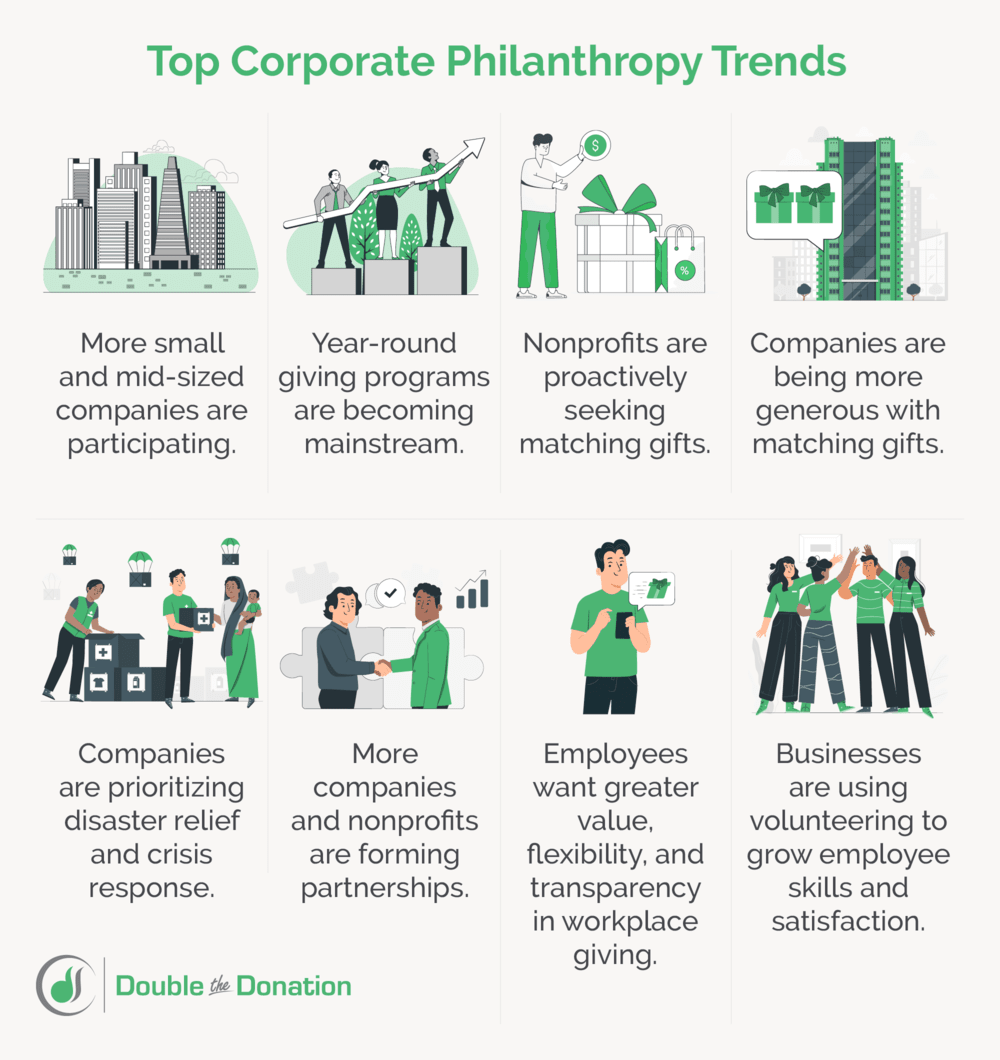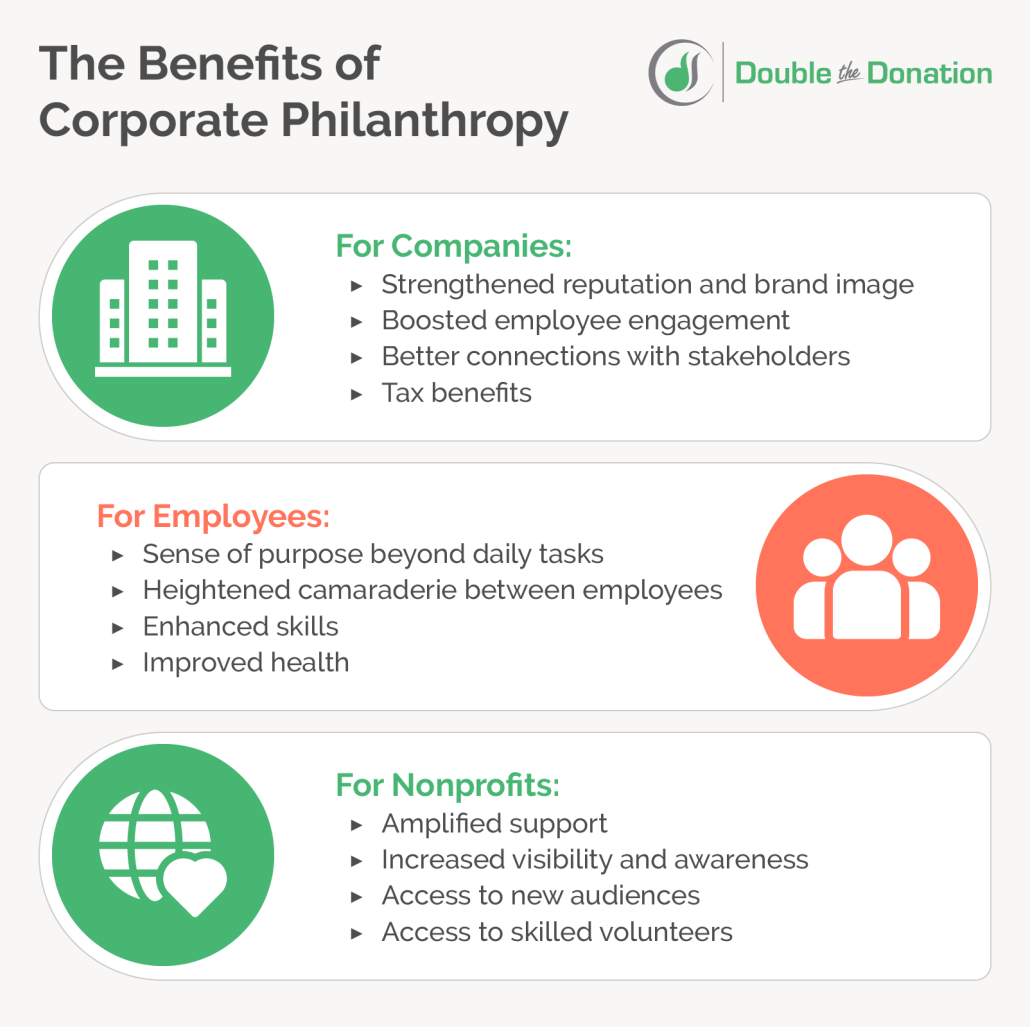Discovering How Business Philanthropy Shapes Brand Name Online Reputation and Customer Loyalty
Company philanthropy considerably influences brand credibility and consumer loyalty. Firms that take part in genuine philanthropic campaigns commonly see a positive change in exactly how customers view them. This positioning of worths fosters depend on and emotional connections with target markets. The performance of these kind efforts can differ significantly. Understanding what genuinely reverberates with customers is important for brand names looking for to improve their social impact and market placement. What approaches will become crucial for future success?
The Evolution of Company Philanthropy
As companies significantly recognize their duty in culture, the development of company philanthropy has actually transformed from mere charitable donations to a tactical part of brand name identification. Initially, companies participated in philanthropy primarily for tax advantages or to improve their public image. With time, this method shifted as stakeholders-- including consumers, staff members, and investors-- required a more authentic commitment to social responsibility.
Organizations started straightening their philanthropic efforts with their core values and business goals, bring about even more thoughtful and impactful contributions. This change has actually urged firms to purchase lasting practices and community development, cultivating a sense of purpose that reverberates with consumers.
Additionally, technological advancements have assisted in transparency and involvement, permitting services to display their kind initiatives better. Business philanthropy has arised as an essential part of business approach, with companies embracing the chance to favorably influence culture while boosting their overall brand name story.
The Effect of Philanthropy on Brand Perception
While firms take part in humanitarian efforts to promote social great, these efforts considerably shape brand name assumption amongst consumers. Business philanthropy can boost a brand's photo by connecting it with favorable social impact and community participation. Consumers usually regard brands that actively join philanthropic tasks as even more trustworthy and responsible. This assumption can affect investing in choices, as consumers may prefer brands that show a dedication to social issues.

Building Emotional Links Via Providing
Corporate philanthropy works as a powerful tool for enhancing brand name identity by connecting business worths with community needs. Through strategic giving, firms can foster neighborhood engagement and create common worths that reverberate with consumers on an emotional level. This method not just enhances brand reputation however additionally develops long lasting connections between services and their stakeholders.
Enhancing Brand Identification
They not only add to societal excellent yet likewise create much deeper psychological connections with their target markets when business involve in philanthropic efforts. By aligning their brand name with charitable causes, companies enhance their identification and signal worths that resonate with customers. This positioning develops a story that goes past services and products, inviting clients to join a shared objective. As consumers progressively prioritize purpose-driven brand names, companies that actively take part in giving can distinguish themselves in a jampacked market. Such initiatives cultivate a sense of commitment amongst clients who feel directly connected to the brand name's values. Inevitably, company philanthropy ends up being a crucial tool for enhancing brand identity, growing long lasting connections based upon common beliefs and emotional engagement.
Fostering Neighborhood Interaction
Many researches suggest that companies participating in community-focused humanitarian efforts can significantly reinforce psychological connections with their stakeholders. By spending in neighborhood projects and supporting social reasons, businesses grow a sense of belonging and count on within the area. This interaction cultivates a favorable brand name picture, as clients value business that show authentic issue for societal issues. Furthermore, staff members often really feel much more motivated and honored to be related to an organization that focuses on community welfare. Therefore, customers are more probable to establish commitment in the direction of brands that proactively contribute to purposeful reasons. Ultimately, cultivating area interaction through philanthropy not just enhances brand name credibility however additionally develops lasting emotional ties that benefit both the area and the company it offers.
Producing Shared Worths
Just how can companies effectively develop common worths that reverberate with their stakeholders? Companies can attain this by aligning their kind efforts with their core goal and the interests of their communities. By taking part in efforts that address regional needs, organizations promote psychological connections with consumers, improving brand name loyalty. Partnering with non-profits that mirror shared values reinforces the brand name's picture and shows commitment to social responsibility. Additionally, transparent interaction concerning these efforts allows stakeholders to see the substantial influence of their contributions. Eventually, by incorporating shared worths into their company philanthropy, business not only boost their track records however additionally grow enduring partnerships with clients, leading to raised loyalty and trust. This placement is essential in contemporary customer decision-making.
Instance Studies: Successful Philanthropic Campaigns
Taking a look at effective kind projects exposes different methods that improve brand name online reputation. Impactful neighborhood initiatives, cutting-edge collaboration versions, and lasting interaction approaches have actually verified effective in promoting positive connections with consumers. These study highlight the value of thoughtful corporate offering in achieving both social and business goals.
Impactful Community Initiatives
Lots of business have effectively leveraged humanitarian campaigns to boost their brand reputation while making a purposeful impact in their areas. For example, a technology firm launched a digital literacy program in underserved areas, offering training and sources that equipped local residents. This campaign not only added to area growth however likewise placed the firm as a socially responsible leader. Similarly, a significant food company executed a cravings relief project, partnering with local nonprofits to disperse dishes to family members in requirement. This effort reinforced neighborhood ties and promoted client commitment. With these impactful efforts, business have shown their commitment to social responsibility, effectively straightening their brand values with the demands of the neighborhoods they serve, eventually improving their overall credibility.
Cutting-edge Partnership Designs
The success of impactful community efforts often hinges on ingenious collaboration models that bring with each other varied stakeholders to deal with complicated social obstacles. Study illustrate how companies, non-profits, and government entities can work together efficiently. A multinational corporation partnered with a neighborhood non-profit to launch an education program, pooling resources and proficiency to boost neighborhood proficiency rates. Another instance involved a technology company and a healthcare company joining pressures to create a telemedicine solution for underserved populations. These partnerships not just magnified the reach of philanthropic initiatives but likewise strengthened the brand names' reputations by straightening their objectives with area needs. Eventually, ingenious collaboration models act as a driver for purposeful adjustment and foster stronger connections in between brand names and their consumers.
Long-term Involvement Methods

Determining the ROI of Corporate Social Duty
As companies increasingly spend in business social duty (CSR) efforts, This Site understanding the return on financial investment (ROI) related to these efforts becomes necessary. Determining ROI in CSR is multifaceted, commonly encompassing both measurable and qualitative metrics. Financial returns can be examined via enhanced sales, improved brand name commitment, and improved employee morale, which can cause greater productivity. Furthermore, firms may examine price financial savings linked to sustainable methods, such as lowered waste or power intake.
Qualitatively, the impact of CSR on brand track record can be examined via customer understanding researches and social media sentiment analysis. Studies can provide understandings right into just how CSR activities influence customer loyalty and trust. Additionally, benchmarking against sector criteria can aid organizations evaluate their CSR effectiveness. Eventually, a detailed strategy to determining ROI enables firms to make informed choices regarding future CSR investments, straightening techniques with both economic performance and social influence
Consumer Assumptions and Corporate Obligation
Increasingly, consumers anticipate companies to operate with a strong sense of company obligation, viewing ethical methods as a requirement for brand commitment. This change in expectation shows an expanding awareness of environmental and social problems, leading consumers to prefer brand names that align with their values. Customers are extra likely to support companies that engage in clear techniques, show sustainability, and add favorably to their communities.
Furthermore, social media enhances these expectations, permitting customers to share their experiences and viewpoints rapidly. Brands that fall short to meet these moral criteria take the chance of backlash, while those that welcome corporate duty commonly delight in superior track record and customer loyalty. As customers require liability, companies need to incorporate corporate social obligation right into their core strategies, focusing on ethical habits not equally as an advertising approach, yet as a fundamental element of their procedures. This placement can ultimately cause more powerful brand name fondness and continual success in competitive markets.
Future Trends in Corporate Philanthropy and Brand Loyalty
The landscape of business philanthropy is progressing, affected by the elevated customer assumptions surrounding business obligation. Business are increasingly incorporating social impact right into their core organization methods, not merely as a supplementary activity. Future trends show a change toward openness, with brand names sharing detailed information about their philanthropic campaigns and their direct effects on neighborhoods.
Technology is playing an essential function, making it possible for real-time interaction in between brand names and consumers. Social network systems facilitate direct communication, enabling customers to voice their expectations and hold brand names answerable. Additionally, younger generations, specifically Millennials and Gen Z, focus on sustainability and moral techniques, driving businesses to adopt even more diligent strategies.
As corporate philanthropy ends up being associated with brand name identification, firms that authentically straighten their objectives with social requirements are most likely to promote more powerful client commitment. This merging of values will eventually form the future of business track record and consumer connections in a progressively conscientious marketplace.
Frequently Asked Inquiries
Just How Do Customers Discover a Company's Philanthropic Initiatives?
Customers find a company's kind initiatives with different channels, consisting of social media sites, news release, community occasions, and word-of-mouth. These opportunities help with recognition, allowing individuals to involve with brands that straighten with their values and passions.
What Function Does Worker Involvement Play in Company Philanthropy?
Worker participation in corporate philanthropy boosts interaction, cultivates a sense of ownership, and reinforces team communication - Homepage corporate philanthropy. This engagement commonly amplifies the effect of philanthropic initiatives, causing better awareness and support for the business's kind initiatives
Can Corporate Philanthropy Backfire on a Brand name's Reputation?
Corporate philanthropy can undoubtedly backfire on a brand name's online reputation if perceived as opportunistic or insincere. Adverse public perception may occur, resulting in reduced count on and loyalty amongst customers who prioritize authenticity in company activities.
Are Smaller Companies as Effective in Philanthropy as Larger Firms?
Smaller sized business can be equally reliable in philanthropy as bigger corporations, frequently showing dexterity and authenticity. Their local efforts might resonate more deeply with areas, promoting real connections despite minimal resources contrasted to their bigger counterparts.
Just How Can Business Pick the Right Triggers to Assistance?
Companies can select the right bring on by straightening their values with area needs, examining stakeholder interests, and evaluating prospective impact. This critical method cultivates authenticity, enhances interaction, and reinforces links with customers and the wider area.
While companies engage in humanitarian efforts to advertise social great, these campaigns significantly form brand name assumption among customers. As customers progressively prioritize purpose-driven brands, business that actively engage in providing can distinguish themselves in a congested market. Lots of business have successfully leveraged philanthropic campaigns to improve their brand credibility while making a meaningful impact in their communities. Significantly, customers expect firms to operate with a strong feeling of business responsibility, watching moral methods as a requirement for brand commitment. As business philanthropy comes to be synonymous with brand name identity, firms that authentically straighten their missions with social needs are most likely to foster more powerful customer commitment.